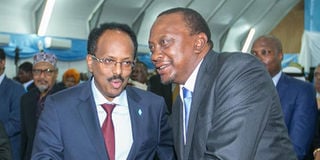Premium
Full in-tray as CS Raychelle Omamo makes maiden visit to Somalia

Foreign Affairs Cabinet Secretary Raychelle Omamo.
What you need to know:
- The trip was confirmed by officials from Foreign Affairs ministries of the two countries, with a diplomat in Nairobi saying it was part of general efforts to iron out bilateral issues.
Kenya’s Foreign Affairs Cabinet Secretary Raychelle Omamo is expected in Mogadishu on Sunday in the latest signal that the two countries are back on working terms.
The trip, her first to Somalia as Foreign minister, is also significant because it comes just two months after the two countries restored diplomatic relations.
The trip was confirmed by officials from Foreign Affairs ministries of the two countries, with a diplomat in Nairobi saying it was part of general efforts to iron out bilateral issues.
“I can confirm that the minister, Amb Raychelle Omamo is expected to arrive in Mogadishu tomorrow for bilateral talks,” an official in the Somalia Ministry of Foreign Affairs and International Cooperation told the Nation on Saturday.
While in Mogadishu, she will meet with her counterpart, Mohamed Abdirizak and Somalia Prime Minister Hussein Roble, and later deliver a message from President Uhuru Kenyatta to Somalia’s President Mohamed Farmaajo.

President Uhuru Kenyatta with Somali President Mohamed Abdullahi Farmaajo, during his inauguration ceremony in Mogadishu, Somalia.
Main agenda
The actual agenda of the trip was not specified but an official at Somalia’s Foreign Ministry said the talks will be centred around strengthening diplomatic ties, resolving border security and how to deal with the outcome of the case in which Somalia sued Kenya at the International Court of Justice ICJ over a maritime boundary.
Sources at the African Union Commission said Kenya recently requested technical assistance from the continental bloc on border issues with Somalia, although it was unclear whether Nairobi wanted a parallel solution to the court.
“The commission wishes to communicate that it stands ready to provide technical assistance regarding border matters to all African Union member states through its Africa Union Border programme (AUBP), upon a joint request,” said a note dated July 28, addressed to Kenya by the AU, and seen by the Nation.
“To this effect, the commission will initiate the process of further consultations between the two parties in the Kenya-Somalia border issues in line with the AU legal instruments.”
Mogadishu sued Nairobi in 2014, demanding a redraw of the boundary in the sea.
The two countries are awaiting the final judgement on their maritime boundary case. Kenya had in the past tried to have the matter resolved out of court.
Under the rules of the court, it is supposed to delimit the boundary but both countries will have to sit down and demarcate it.
A source at the African Union told the Nation that the continental bloc will not seek to undermine the court or the case but will be available to help should both sides agree to a mutual mediation.
Under the ongoing reforms at the AU, however, the Border Programme is technically dissolved, meaning the option, should both sides agree, it is for the AU Commission chairperson, Moussa Faki Mahamat, to appoint a special panel or envoy to help the two countries.

Kenya Defence forces soldiers under the Africa Union Mission in Somalia (Amisom) during a patrol in Kismayo town, Somalia, on November 22, 2015.
Keeping channels open
Nonetheless, officials from both sides admit the six-month diplomatic tiff left a full in-tray of issues to be resolved, beyond the border tiff.
In June, Ms Omamo spoke on phone with her Somalia counterpart. They “emphasised the importance of normalising diplomatic relations between the two countries,” according to a shared dispatch released by both capitals.
“They agreed to keep bilateral diplomatic channels of communications open between the two capitals in all matters of future strategic diplomatic relations.”
Kenya has in the recent past protested at Somalia’s deployment of its troops near the common border, terming it a violation. Somali politicians have accused Kenya of conducting airstrikes in residential areas, an accusation Kenya has refuted.
Bilkheyr Ahmed, a Somali political analyst, told the Nation that a spat between the two neighbours was always going to look bad.
“They should talk and keep talking. They have had many issues of mutual interest for many years,” he said, referring to shared security threats, Somali refugees in Kenya and the maritime border question.
“We can talk of Somali refugees in Kenya for the last 30 years and Somali businesses in Kenya. It should be compulsory to talk about issues that threaten the diplomatic relations, including the maritime border problem.”
Long before severance of ties, Somalia had banned miraa exports from Kenya, angering farmers who say they have been losing between Sh20 and Sh50 million daily. Somalia argues the ban was due to Covid-19 but has not reinstated Kenya’s exports even after allowing the Ethiopian one.
The two countries must also complete discussions on trade issues such as Kenya’s request to have Airways flights to Mogadishu and Hargeisa, and the enduring issue of refugees at Dadaab camp, which hosts a majority of refugees from Somalia.
In May, Kenya and the UN Refugee Agency UNHCR agreed to stagger the closure of Dadaab and Kakuma camps, to allow for a humane departure of refugees.





